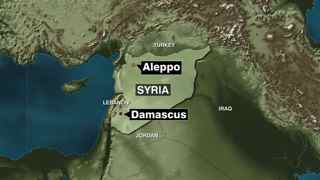 (CNN) -- Just days after Russia and the United States reached a deal on getting Syria to give up its chemical weapons, world powers are quarreling over the details.
(CNN) -- Just days after Russia and the United States reached a deal on getting Syria to give up its chemical weapons, world powers are quarreling over the details.
The agreement, reached by Russian Foreign Minister Sergey Lavrov and U.S. Secretary of State John Kerry over the weekend, calls for a U.N. resolution demanding that Syria turn over its chemical weapons to international control in a specific time frame.
Russia won't support any resolution that would authorize the use of force against Syria if it doesn't comply, Lavrov said Tuesday.
But the United States and France want to keep the threat of force on the table if Syria doesn't comply. Those allies say they are convinced that Syrian President Bashar al-Assad's regime was behind a chemical weapons attack in opposition areas that, according to U.S. estimates, killed more than 1,400 people.
The French analysis of a U.N. chemical weapons report shows the Syrian regime was responsible for the August 21 massacre near Damascus, French Foreign Minister Laurent Fabius told reporters Tuesday.
But, at the same news conference, Lavrov brushed aside a question about blame. He noted that the U.N. inspectors in Syria were not tasked with figuring out who was responsible and that that was not the point of the U.N. report.
Russia has suggested Syrian rebels may have been behind the attack, though critics have said rebels did not have the means to unleash chemical weapons.
A scathing report
U.N. weapons inspectors gave "overwhelming and indisputable" evidence that nerve gas was used in Syria, U.N. Secretary-General Ban Ki-moon said Monday.
The team found "clear and convincing evidence" that the nerve agent sarin was delivered by surface-to-surface rockets "on a relatively large scale" in the August 21 attack on a Damascus suburb.
"It is the most significant confirmed use of chemical weapons against civilians since Saddam Hussein used them in Halabja in 1988, and the worst use of weapons of mass destruction in the 21st century," Ban said. "The international community has a responsibility to ensure that chemical weapons never re-emerge as an instrument of warfare."
The diplomatic quarrel over just who may have been responsible for the chemical weapons attack came as the toll from conventional weapons continued to mount.
The opposition Local Coordination Committees in Syria reported that 89 people -- including 10 children and seven women -- were killed Monday nationwide.
Syrian-Turkish border tension
A blast rocked the Syrian side of the Turkish-Syrian border Tuesday, Turkey's semiofficial Anatolian news agency reported.
Video shot by activists showed torrents of black smoke emerging from blazing vehicles at the crossing as survivors tried to help victims.
The LCC said the attack wounded many people.
The explosion, which happened near a border gate, comes a day after Turkish planes shot down a Syrian helicopter crossing into Turkey. It came down on Syrian territory, Turkish Deputy Prime Minister Bulent Arinc said.
Syria's state news agency SANA said the helicopter was watching for "terrorists" crossing the border and erroneously strayed into Turkish airspace, but was on its way back across the border when shot down.
CNN's Richard Allen Greene, Josh Levs, Aliza Kassim, Joe Sterling and Jennifer Deaton contributed to this report.
Portland and Seattle
Free Subscription to Breaking News
Free Subscription to Breaking News























































































































































































































































































































































